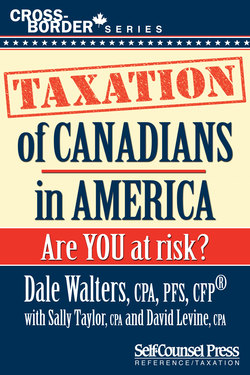Taxation of Canadians in America

Реклама. ООО «ЛитРес», ИНН: 7719571260.
Оглавление
David Levine. Taxation of Canadians in America
TAXATION OF CANADIANS IN AMERICA: Are YOU at risk?
Introduction
1. The Basics of US Taxation
1. History of the Internal Revenue Service (IRS)
2. The Basics
3. Dealing with the IRS
4. The IRS Examination (Audit) Process
5. Filing
Table 1: INCOME THRESHOLDS FOR FILING
5.1 When to file your Individual Income Tax Return (Form 1040)
5.2 Electronic filing
5.3 Penalties and interest for underpayment, late filing, and late payment
5.4 Filing status
6. Notifying the IRS about Your Change of Address
2. Your First Year in the US
1. Determining US Residency
1.1 First year elections
Table 2: US IMMIGRATION OPTIONS
Table 3: YOUR STATUS: NONRESIDENT ALIEN OR RESIDENT ALIEN
2. How Do I Get an Identification Number?
3. The Treaty
Table 4: TREATY ARTICLES
1. Residency
2. Real Property
3. Dividends, Interest, and Royalties
4. Gains
5. Personal Services
6. Artists and Athletes
7. Pensions and Annuities
8. Social Security
9. Government Service
10. Students
11. Taxes Imposed by Reason of Death
Table 5: TYPES OF INCOME AND WITHOLDING RATES
4. Canadian Taxation of Nonresidents
1. Who Is Considered a Nonresident of Canada?
2. Selling Property in Canada
5. Foreign Tax Credits
1. What Are Foreign Tax Credits?
2. Types of Foreign Income
3. How to Calculate the Foreign Tax Credit
4. Alternative Minimum Tax (AMT)
6. Registered Retirement Plans, Pensions, and Social Security
1. Registered Retirement Plans
1.1. Deferral
1.2 Distributions
1.3 Planning
Table 6: RRIF MINIMUM WITHDRAWALS BY AGE
1.4 How the taxes work
1.5 Other types of accounts
2. Pensions
3. Social Security
3.1 The Windfall Elimination Provision
7. Investments
1. Securities Law
2. Mutual Funds
Table 7: SUMMARY OF EXPENSES
2.1 Passive foreign investment company (PFIC) rules
2.1a Qualified electing fund (QEF)
2.1b Mark-to-market election
2.1c Excess distribution
3. Tax Reporting Slips
4. Taxation of Specific Types of Investments
4.1 Municipal bonds
4.2 Government bonds
4.3 Annuities
4.4 Personal residence
4.5 Investment real estate
5. Treaty Rules That Affect Your Securities
8. Common Deductions
Table 8: THE FORMAT OF THE US INDIVIDUAL INCOME TAX RETURN (FORM 1040)
1. Above-the-Line Deductions
2. Trade or Business Expenses
Table 9: TRADE OR BUSINESS EXPENSES
3. Vacation or Rental Home Expenses
Table 10: VACATION/RENTAL HOME
4. Depreciation, Amortization, and Depletion Expenses
Table 11: CLASSES OF DEPRECIATION PROPERTY
5. Individual Losses to Property
6. Alimony and Child Support
7. Contributions to Individual Retirement Accounts (IRAs)
8. Moving Expenses
9. Health Savings Accounts (HSA)
10. Qualified Education Expenses and Student Loan Interest
11. Exemptions
12. Standard Deductions or Itemized Deductions
12.1 Standard deductions
Table 12: STANDARD DEDUCTION AMOUNTS
Table 13: ADDITIONAL DEDUCTION AMOUNTS
12.2 Itemized deductions
13. State and Local Taxes
14. Interest Expenses
15. Medical Expenses
Table 14: LIMITS ON MEDICAL DEDUCTIONS
16. Employee Educational Expenses
17. Charitable Contributions
18. Miscellaneous Itemized Deductions
19. Credits
19.1 Child and dependent credit
19.2 Credit for the elderly or disabled
19.3 Child tax credit
19.4 Earned income credit
19.5 Education credits
19.6 Retirement savings contributions credit
19.7 Other credits
9. Tax Planning
1. Tax Planning in General
2. Specific Tax-Planning Opportunities
2.1 Your principal residence
2.2 Other real estate investments
2.3 Securities
2.4 Series EE bonds and I bonds
3. Tax Breaks for Senior Citizens
4. State Income taxes
5. Community Property
10. US Estate and Gift Taxes
1. US Nonresident Estate Tax
2. US Resident, Noncitizen Estate Tax
Table 15: GIFT AND ESTATE TAX RATE SCHEDULE
Table 16: UNIFIED TAX CREDITS AND EXCLUSION AMOUNTS
2.1 Jointly held property
3. Gift Taxes
4. Generation Skipping Transfer Tax
5. State Estate and Inheritance Tax
Table 17: STATE ESTATE AND INHERITANCE TAX
11. Leaving the US
1. Expatriation
1.1 Your rights after renunciation of US citizenship
1.2 The Reed Amendment
2. Tax Planning before You Leave
Conclusion
Resources: Contact Information for State Taxing Agencies
Acknowledgments
About the Authors
Notice to Readers
Self-Counsel Press thanks you for purchasing this ebook
Contents
Отрывок из книги
We estimate that more than 1 million Canadians file tax returns in the US and another 1 million should be filing, but don’t. Based on our experience, many of those that do file have a number of mistakes that could be very costly if the Internal Revenue Service (IRS) were to discover those mistakes. Of those who don’t file, but should, we find the main reason is that they do not fully understand the US residency requirements and therefore the requirement to file US tax returns.
As Canadians, you can hardly be blamed for the fact that, as a group, your US tax returns are most likely being done incorrectly. Taxation in general is complex enough, add to that rules that are seldom used by most tax preparers, then toss in the Treaty that can modify the Canadian Income Tax Act and the US Internal Revenue Code and you have a very complex set of rules. If that were not bad enough, in a number of cases, there are no clear rules or regulations addressing the issues you are facing, which makes it very difficult to file correctly even if you are trying to do the right thing.
.....
• Information matching: Some returns are examined because payer reports (i.e., tax slips), such as Forms W-2 from employers or Miscellaneous Income (Form 1099) statements from banks and brokerage firms, do not match the income reported on the tax return.
• Related examinations: Returns may be selected for audit when they involve issues or transactions with other taxpayers, such as business partners or investors, whose returns were selected for examination.
.....